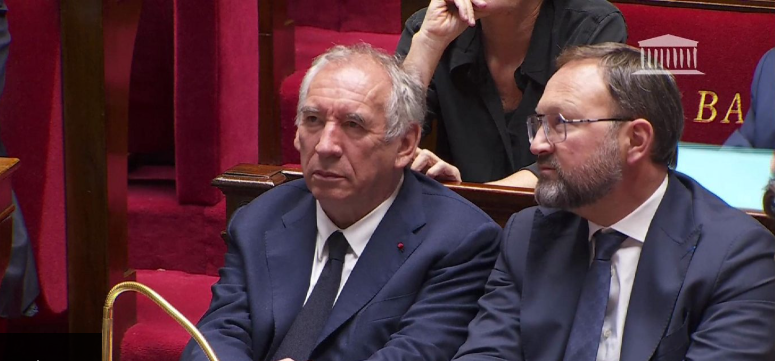
France is plunged into a fresh political crisis as MPs vote to oust the prime minister.
French Prime Minister François Bayrou has lost the vote of confidence he called in his government.
France's National Assembly has voted by 364 votes to 194 to eject him from office and bring down his minority government. Another 25 MPs abstained.
François Bayrou called the surprise vote of confidence in himself after huge opposition to his budget plans.
His defeat was inevitable - but France's enormous pile of debt remains, writes The BBC Europe digital editor.
Francois Bayrou now has to present Emmanuel Macron with the resignation of his government, which according to French media he will do tomorrow morning.
Macron now has several options - none of which he will find particularly appealing.
He can pick a new prime minister. Choosing a name that will not be immediately shot down by one of the large parliamentary factions may not be an easy feat and last year the process took Macron several weeks. Meanwhile, Bayrou will likely stay on as caretaker until a new successor is appointed
Macron could also call a new parliamentary election. This would shake the current composition up but may result in an even more decisive victory for the Marine Le Pen's far right National Rally (FN)
Macron also has the option of calling a presidential election - in which he would not be able to run, as his second term is due to end in 2027. Some parliamentary groups have been calling for him to take this route, but he has repeatedly ruled out stepping down
Although François Bayrou's defeat was expected, the numbers are surprising - according to political analyst Alexandre Kouchner.
"It means that even from within the central coalition, probably from the conservatives - Les Républicains - some MPs voted against Bayrou," he tells BBC News.
"This means that within the presidential coalition there are already clear cracks and divides, which sort of muddies the water even more," Kouchner continues.
The result of the vote doesn't resolve the two main problems, Kouchner says, which is an end to France's hung parliament or its ongoing debt crisis.
As Assembly President Yaël Braun-Pivet announced the result of Bayrou's defeat, MPs applauded loudly and the outgoing prime minister sat stony-faced.
"The National Assembly has not approved [the PM's] general policy statement," she said, adding that under the constitution "the prime minister has to submit the resignation of the government to the president of the republic".
Bayrou walked out of parliament and he was then driven the short distance to the prime minister's Paris residence at the Hôtel Matignon, followed by TV cameras perched on the back of motorbikes.
A familiar scene in French politics, just like Bayrou's trip across Paris to the Élysée Palace where he'll hand in that resignation to Emmanuel Macron.
In his final words to MPs before the vote, Bayrou insisted the past nine months spent as prime minister had been a period of "profound happiness" because, despite everything, his government had worked with great solidarity and friendship without "a single crisis and a single tension".
In France, the president (Emmanuel Macron) is the head of state, elected by the French public. The president is in charge of the country's foreign policy and defence, and representing France on the international stage.
The prime minister (François Bayrou) is the head of government, appointed by the president.
The PM is in charge of day-to-day governing. The PM answers to parliament, and must be approved by them. Parliament can also vote to oust the PM.
Pressure will be strong on President Macron to name a prime minister from the left.
After all, the last two nominees (Barnier and Bayrou) were from the right and centre, and a left alliance came out numerically top in the 2024 election. As head of the Socialist Party (PS), Olivier Faure would be one possibility.
The 57 year-old has a group of 66 deputies in the National Assembly. Half-Vietnamese by birth, he is a modest and moderate figure who has spent his life in Socialist politics.
His main handicap is the party’s troubled relationship with the far-left firebrand Jean-Luc Mélenchon. That is why Macron might turn to a personality who identifies broadly with the Socialists, but is not necessarily of their ranks.
Two such figures are the former prime minister Bernard Cazeneuve, and the veteran ex-minister Pierre Moscovici, currently head of the Cour des Comptes (the official accounting office).
Another intriguing possibility is the current finance minister Eric Lombard, who although by trade a banker is known for his social-liberal leanings.
If Macron decides to stick with the centre and right, his first choice would probably be the defence minister Sebastien Lecornu. The 39 year-old was in the running last December before the nomination of François Bayrou.
He is said to be close to President Macron, who has given him the task of building up French military capabilities. A political conservative, Lecornu was a member of the Gaullist UMP party and its successor the Republicans (LR).
He left to join Macron’s party when the president was first elected in 2017. Another conservative whose name has been mentioned is the current minister of labour and health Catherine Vautrin.
Two other possibilities from inside government are Interior Minister Bruno Retailleau, who now leads LR, and Justice Minister Gérald Darmanin.
But with all eyes on the 2027 presidential election, would these heavyweights want the electoral kiss-of-death which is to be Macron’s next PM?






![[PHOTOS] Ruto joins State House families in worship](/_next/image?url=https%3A%2F%2Fcdn.radioafrica.digital%2Fimage%2F2025%2F09%2Fa6dc59b3-4273-4667-bd88-1fffcb5c00d3.jpg&w=3840&q=100)




